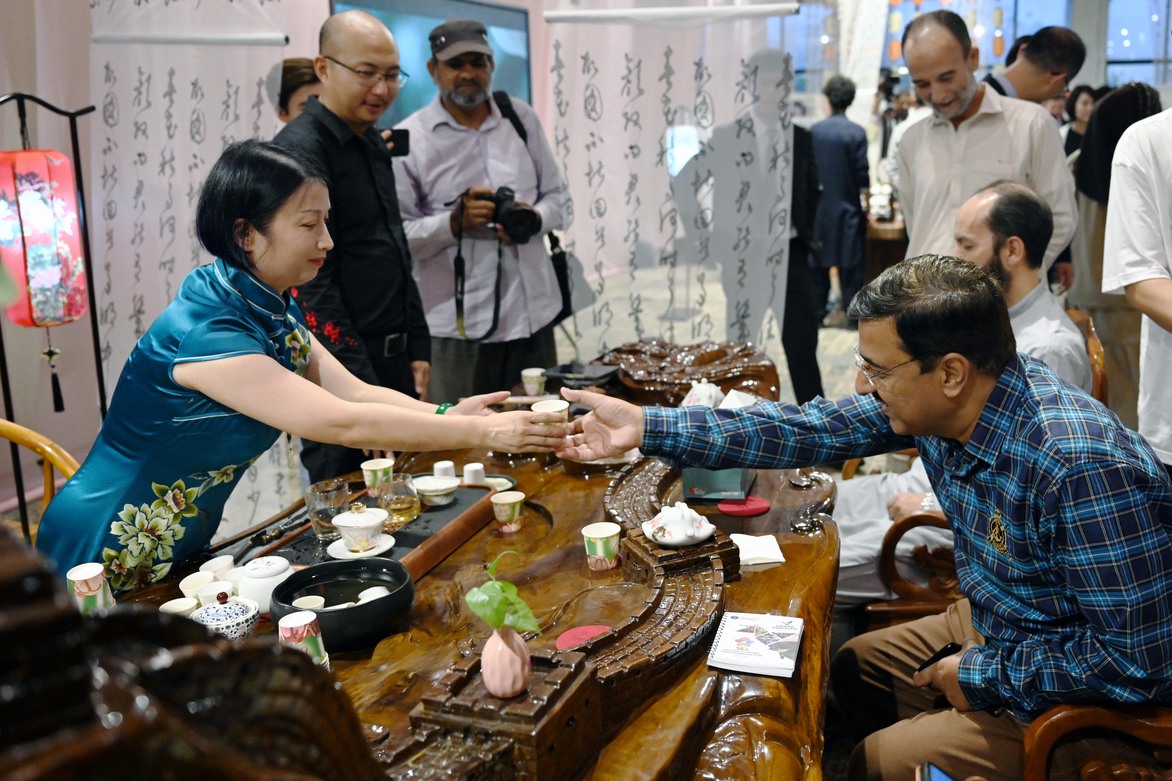Tea for harmony: Int'l Tea Day brings cultures together in Islamabad
Xinhua
23 May 2025

by Ahmed Raza
ISLAMABAD, May 23 (Xinhua) -- The soft clink of delicate cups, the gentle swirl of steam, and the earthy fragrance of freshly brewed leaves welcomed guests into a space transformed by tradition.
On Wednesday afternoon, the Chinese Embassy in Pakistan transformed the Sir Syed Memorial Building at Islamabad's Silk Road Cultural Center into a vibrant tea house. The occasion was International Tea Day, and more than 400 guests -- both Chinese and Pakistani -- from the diplomatic corps, cultural institutions, academia, and media gathered to celebrate with enthusiasm and curiosity.
The theme was simple but meaningful: "Tea for Harmony." And as conversations flowed over cups of green, oolong, and floral teas, it was clear that harmony wasn't just an idea, but something people could taste and feel.
In his welcoming speech, Chinese Ambassador to Pakistan Jiang Zaidong highlighted tea as a symbol of peace and understanding.
"Tea reflects our values -- humility, harmony, and empathy," he said. "In China, we say 'build friendship through tea' and 'harmony is most precious'."
It was a poetic way to begin a day filled with performances, laughter, and, of course, plenty of tea.
Visitors wandered between tea stalls, each offering a different variety; some bitter, some floral, others surprisingly sweet despite having no sugar at all. For many guests, it was their first time tasting authentic Chinese tea.
Among them was Abdul Malik, a local YouTuber, who said he had heard about the health benefits of Chinese tea online. "People say it helps with cholesterol, sugar, even pain," he said with a grin. "So I had to try. And honestly? It's very tasty. I feel fresh already."
He even found a favorite among the blends. "There was one with flowers ... in our language, we call it something else, but it was really nice. No sugar needed."
While International Tea Day has only been around since 2020, the cultural legacy behind it is ancient.
The event in Islamabad captured that spirit, not just by showcasing tea, but by highlighting how it connects civilizations.
Zamir Ahmed Awan, a professor and founding chair of the Global Silk Route Research Alliance, offered deeper insight.
"Chinese tea culture is thousands of years old. Every region in China has its own style, its own story," he said. "Having lived in China for years, I still drink green tea in summer and pu-erh in winter. It's a way of life."
Awan believes Pakistani palates are ready for a change -- one sip at a time.
"Most of us grew up drinking British-style tea with milk and sugar. That's not our heritage, it was introduced during colonial times," he said.
"Now, thanks to growing ties through CPEC (the China-Pakistan Economic Corridor) and cultural events like this, there's a new openness to learning from China -- not just economically, but culturally."
And tea, he added, is a perfect gateway.
Organized as part of the UN's International Tea Day, this annual celebration aims to highlight tea's role in health, heritage, and livelihoods.
But in Islamabad, it did something more: it brought people together around tables, across languages, through smiles shared over hot cups.
